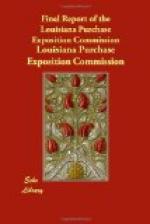On April 23, 1903, the royal commission of King Edward VII was issued at Whitehall under His Majesty’s royal sign, appointing the following commissioners to the Louisiana Purchase Exposition:
The Prince of Wales; Arthur Wellesley, Viscount Peel;
Victor Albert
George, Earl of Jersey; Richard George Penn, Earl
Howe; Bernard Edward
Barnaby, Baron Castletown; George Arbuthnot, Baron
Inverclyde; Richard
Barnaby, Baron Alverstone; John, Baron Avebury; Horace
Cruzon Plunkett;
Charles Napier Lawrence; Sir Charles William Fremantle;
Sir George
Hayter Chubb; Sir Edward John Poynter; Sir Charles
Rivers Wilson; Sir
Edward Maunde Thompson; Sir William Henry Preece;
Sir William Turner
Thiselton-Deyer; Sir Herbert Jekyll; Sir Lawrence
Alma Tadema; Sir
Caspar Purdon Clarke; Sir George Thomas Livesey; Henry
Hardinge; Samuel
Cunyghame; Edward Austin Abbey; Charles Vernon Boys;
Thomas Brock;
George Donaldson; Clement Le Neve Foster; John Clarke
Hawkshaw; Thomas
Graham Jackson; William Henry Maw; Francis Grant Ogilvie;
William
Quiller Orchardson; Boverton Redwood; Alfred Gordon
Salamon; Joseph
Wilson Swan; Jethro Justinian Harris; Teall, and Francis
William Webb.
Col. Charles Moore Watson was appointed secretary to the commission. Subsequently, on the 6th of June, 1903, Sir John Benjamin Stone, M.P., was appointed additional commissioner.
At the first meeting of the royal commission, held at Marlborough House on the 28th of April, 1903, His Royal Highness the Prince of Wales, K. G., made a speech showing the interest that was felt in the exposition generally throughout Great Britain.
The interest taken in the exposition by Great Britain was exemplified strikingly in the amount of space which she occupied in the various exhibition buildings, amounting in the aggregate to no less than 206,642 superficial feet, of which only 8,000 feet was occupied by the Royal Pavilion. An idea of the vast scope of the exhibit may be learned from the following table, which gives the amount of space in each of the various exhibit palaces occupied by Great Britain’s display:
Superficial feet. Education ...................... 6,500 Social economy ................. 810 ------- 7,310 Art .................................... 20,872 Liberal arts ........................... 35,500 Manufactures ........................... 58,000 Electricity ............................ 5,960 Transportation ......................... 33,500 Agriculture ............................ 20,400 Horticulture ........................... 500 Forestry, Fish, and Game ............... 3,900 Mines and Metallurgy ................... 11,700 Physical Culture ....................... 1,000
In making choice of an interesting type to be followed in the British Royal Pavilion at the Louisiana Purchase Exposition, it was felt that the Orangery of the Royal Palace of Kensington would be representative of English




